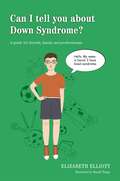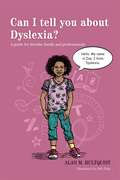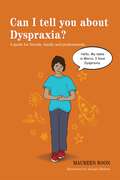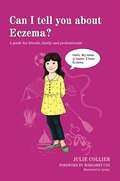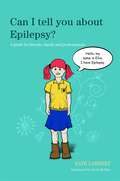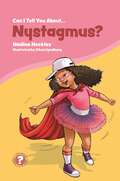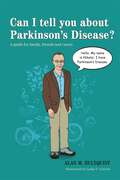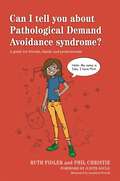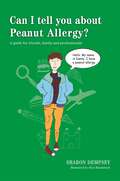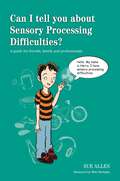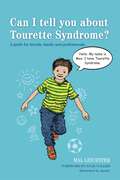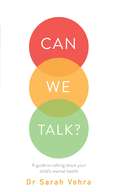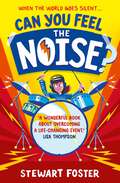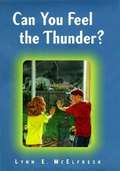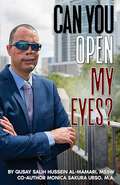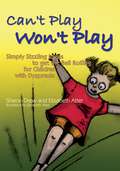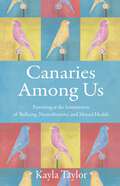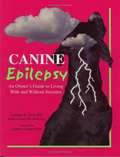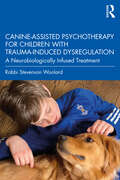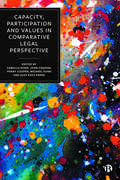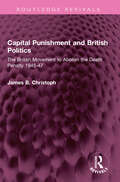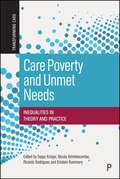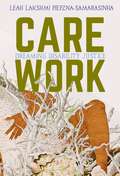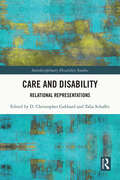- Table View
- List View
Can I tell you about Down Syndrome?: A guide for friends, family and professionals
by Elizabeth Elliott Manjit ThappMeet David - a boy with Down syndrome. David invites readers to learn about Down syndrome from his perspective, helping them to understand what Down syndrome is and how it affects his daily life. He explains that he sometimes needs extra help at home and school and suggests ways that those around him can help him to feel supported. This illustrated book is ideal for young people aged 7 upwards, as well as parents, friends, teachers, social workers and other professionals working with children with Down syndrome. It is also an excellent starting point for family and classroom discussions.
Can I tell you about Dyslexia?: A guide for friends, family and professionals
by Alan M. Hultquist Bill TulpMeet Zoe - a young girl with dyslexia. Zoe invites readers to learn about dyslexia from her perspective. She helps readers to understand the challenges faced by a child with dyslexia, explaining what dyslexia is and how it affects her at home and at school. Zoe describes exactly why she finds reading, writing and words so difficult, and how other people can help her in these areas. This illustrated book is ideally suited for readers aged 7 and upwards, and will be an excellent way to start a discussion about dyslexia, in the classroom or at home.
Can I tell you about Dyspraxia?: A guide for friends, family and professionals
by Maureen Boon Imogen HallamMeet Marco - a boy with dyspraxia, which is sometimes called Developmental Co-ordination Disorder (DCD). Marco invites readers to learn about dyspraxia from his perspective, helping them to understand what it is and what it feels like when he sometimes struggles to control his movement and co-ordination. He talks about the challenges of having dyspraxia and lets readers know how he can be helped and supported. This illustrated book will be an ideal introduction for young people, aged 7 upwards, as well as parents, friends, teachers and professionals working with children with dyspraxia. It is also an excellent starting point for family and classroom discussions.
Can I tell you about Eczema?: A guide for friends, family and professionals
by Apsley Julie Collier Margaret CoxMeet Helen - a girl with eczema. Helen invites readers to learn about this skin condition from her perspective, describing how it feels to have itchy and inflamed skin nearly all the time. She explains how different creams, ointments and other treatments can help her skin to feel better and lets readers know about other ways she can be helped and supported. This illustrated book is ideal for young people aged 7 upwards, as well as parents, friends, teachers and nurses. It is also an excellent starting point for family and classroom discussions.
Can I tell you about Epilepsy?: A guide for friends, family and professionals
by Kate Lambert Scott HellierMeet Ellie - a young girl with epilepsy. Ellie invites readers to learn about epilepsy from her perspective. She introduces us to some friends who help present the varying forms of epilepsy. Ellie and her friends help children to understand the obstacles that they face by telling them what it feels like to have epilepsy, how it affects them physically and emotionally, how epilepsy can be treated and how the condition is often misunderstood by people who do not know the facts. This illustrated book is full of useful information and will be an ideal introduction for children from the age of 7. It will also help parents, friends, and professionals to make sense of the condition in its varying forms and will be an excellent starting point for family and classroom discussions.
Can I tell you about Nystagmus?: A guide for friends, family and professionals
by Nadine Neckles Vikas UpadhyayIn this friendly guide, a girl called Amber explains all about her 'dancing eyes,' or nystagmus. Amber explains how children with nystagmus might need to read, learn or play differently, and what their families, school and friends can do to help. She invites readers to learn the causes and symptoms, to help others understand the condition and help increase the self-esteem and confidence of those who have it.This accessible guide for children aged 7+ is an excellent starting point for parents, teachers and other professionals working with children with nystagmus. It includes a practical checklist of easy adaptations to make school or home environments easier and more enjoyable for children with nystagmus, as well as a helpful list of recommended resources for additional support.
Can I tell you about Parkinson's Disease?: A guide for family, friends and carers
by Alan M. Hultquist Lydia CorrowMeet Nikolai - a man with Parkinson's disease. Nikolai invites readers to learn about Parkinson's from his perspective, helping them to understand how Parkinson's affects his daily life and why some tasks can be especially challenging for him. He also gives advice on how to help someone with Parkinson's when they have difficulties with physical movements and memory. This illustrated book is full of useful information and will be an ideal introduction for children from the age of 7, as well as older readers. It will help family, friends and carers better understand and explain the condition, and will be an excellent starting point for group discussions.
Can I tell you about Pathological Demand Avoidance syndrome?: A guide for friends, family and professionals
by Judith Gould Phil Christie Ruth Fidler Jonathon PowellMeet Issy - an 11-year-old girl with pathological demand avoidance syndrome (PDA), a condition on the autism spectrum. Issy invites readers to learn about PDA from her perspective, helping them to understand how simple, everyday demands can cause her great anxiety and stress. Issy tells readers about all the ways she can be helped and supported by those around her. This illustrated book is for readers aged 7 and upwards, and will be an excellent way to increase understanding about PDA in the classroom or at home. It also includes practical tips and recommended resources for parents and professionals.
Can I tell you about Peanut Allergy?: A guide for friends, family and professionals
by Alice Blackstock Sharon DempseyMeet Danny - a boy with a peanut allergy. He explains that peanut allergies can be very serious, but once you know how to manage them, they don't have to get in the way of living a fun and full life. Danny talks about what a peanut allergy is, what do to in an emergency, and how his friends and family can help him to live a nut free life. He also shares advice on coping with a peanut allergy on special occasions and trips away. This illustrated book is ideally suited for readers aged 7 and upwards, and will be an excellent way to increase awareness about peanut allergies, in the classroom or at home. It also includes clear, useful information for parents and professionals.
Can I tell you about Sensory Processing Difficulties?: A guide for friends, family and professionals
by Mike Medaglia Sue AllenMeet Harry - a young boy with sensory processing difficulties. Harry invites readers to learn about why he finds it hard to process sensory information effectively, and how even simple thing such as washing, dressing and coping with meal times can be challenging for him. He also talks about difficulties he faces at school and why large groups and loud noises are especially hard. He explains how other people can have different sensory processing issues and talks about what he and those around him can do to help. This illustrated book is ideally suited for readers aged 7 and upwards and occupational therapists, teachers, parents, family members and friends of those with sensory processing difficulties.
Can I tell you about Tourette Syndrome?: A guide for friends, family and professionals
by Mal Leicester Apsley Julie CollierMeet Max - a boy with Tourette syndrome (TS). Max invites readers to learn about Tourette's from his perspective, helping them to understand what tics and triggers are and what it feels like to have TS. He explains how living with TS can sometimes be difficult, and how people around him can help him to feel happy and accepted. This illustrated book is ideal for young people aged 7 upwards, as well as parents, friends, teachers and other professionals working with children with TS. It is also an excellent starting point for family and classroom discussions.
Can We Talk?: About Mental Health in Children and Young People
by Sarah Vohra'Parental anxiety is natural, but if you think something's wrong - trust your instincts. Talk to your child and seek professional help sooner, rather than later'. - Dr Sarah VohraHow do you know what to worry about - and what not to worry about?How do you keep the lines of communication open?When - and how - should you seek professional help?In Can We Talk? consultant child psychiatrist Dr Sarah Vohra shares an easy-to-use traffic light system that will help you to navigate tricky early conversations. Whether your child is 6 or 16, the expert advice and practical tools in this book cover such key concerns as sleep, low mood, anxiety and self-harm. This updated edition also includes a new chapter on the impact of social media on your child's wellbeing, with strategies to help you support them in a world where Instagram and Snapchat multiply the pressure to be perfect at all levels and all times.Whether your child is a preschooler or a teenager, this is an invaluable resource for anyone worried about a young person's mental health.
Can You Feel the Noise?
by Stewart FosterA profound story about inner strength and perseverance in the face of a life-changing event, from the award-winning author of The Bubble Boy. Perfect for fans of R. J. Palacio's Wonder and Lisa Thompson's The Goldfish Boy.&‘A wonderful book about overcoming a life-changing event and the remarkable power of music.&’ – Lisa Thompson, author of The Goldfish BoyLife is going well for Sophie. She&’s getting by at school, has some pretty awesome friends, and their band have made it through to the semifinals of the Battle of the Bands competition.But when Sophie wakes up completely deaf one morning, the life she once knew seems like a distant memory. With lessons replaced by endless hospital appointments, and conversations now an exercise in lip-reading, Sophie grows quieter and quieter. Until she discovers the vibrations of sound through an old set of drums and wonders whether life onstage is actually still within reach.Drawing on the author's own hearing impairment, Can You Feel the Noise? is a deeply personal and moving story that will stay with you long after reading.Praise for Can You Feel the Noise? &‘Powerful, moving and uplifting. This beautifully-told story highlights the gift of perseverance.&’ – Polly Ho-Yen, author of Boy in the Tower &‘A moving, empathy-boosting, and hopeful story about a young musician navigating hearing loss.&’ – Rashmi Sirdeshpande, author of Think Like a Boss 'A sensitive and brilliant story of hearing loss, full of humour and hope.&’ – A. M. Howell, author of The Garden of Lost Secrets
Can You Feel the Thunder? (First Edition)
by Lynn E. McelfreshThirteen-year-old Mic Parsons struggles with mixed feelings about his deaf and blind sister while at the same time he makes his way through the turmoils of junior high.
Can You Open My Eyes?
by Qusay Hussein Monica UrsoQusay Hussein was just seventeen years old when a car bomber changed his life and he lost his vision. That was the beginning of a journey from Iraq, to Jordan, and across the world to the United States. That one moment caused Qusay to leave Iraq and his family, and start a solo adventure in a new country learning English. Despite incredible challenges and physical trauma that resulted in more than 70 reconstructive surgeries, Qusay shares his story with unforgettable positivity, strength, humor, and courage. He makes life in Iraq and the United States come alive for us and we see new things through his eyes. You will never forget this incredible testament to human resilience and determination.
Can't Play Won't Play: Simply Sizzling Ideas to get the Ball Rolling for Children with Dyspraxia
by Sharon Drew Elizabeth AtterLearning to roller skate or ride a bike should be an enjoyable experience, but for a child with developmental co-ordination disorder (DCD, also known as dyspraxia), these activities can lead to frustration and failure. Can't Play Won't Play is full of practical information, tips and hints to enable children with DCD to access and enjoy activities that other children take for granted. Whatever game you choose to try with your child, this book will offer handy hints for developing the necessary skills to make it a fun and rewarding experience. From football and rugby to swimming, skipping and skating, the advice covers all the regular childhood activities as well as games to improve physical organization and social skills. The authors provide useful equipment lists and safety tips, and include photographs and diagrams to demonstrate the activities. The delightful illustrations add to the book's appeal, making it a friendly and accessible guide to dip into when you are in need of inspiration. Can't Play Won't Play is an essential resource for parents, teachers and all those working with children with DCD.
Canaries Among Us: Parenting at the Intersection of Bullying, Neurodiversity, and Mental Health
by Kayla Taylor“riveting … powerful … brilliant … necessary”—Kirkus Reviews For those drawn to both Tara Westover’s moving account of a difficult childhood and Susan Cain’s research on underappreciated traits … Canaries Among Us reveals the exquisite joy and tender heartache inherent in raising a child who is undervalued by a community. A lifeline to those struggling with learning differences, bullying, and anxiety, Canaries Among Us explores one of the most widespread threats to child well-being: a lack of acceptance. This heart-rending exposé provides a candid view of the ways unique children are regularly misunderstood and mistreated. Fortunately, through raw storytelling and ground-breaking science, Taylor points to an inspirational alternative: supporting, and even celebrating, the dazzling variety of our humanity. The author is donating her profits to organizations promoting mental health, neurodiversity, and bullying prevention.Note: This book was previously subtitled "A Mother’s Quest to Honor her Child’s Individuality in a Culture Determined to Negate It."
Canine Epilepsy: An Owner's Guide to Living With and Without Seizures
by Caroline D. LevinThis canine Epilepsy guide helps you to not only understand what this disease entails but also the kinds of things that can help your dog gain control- including medical issues or treatments that can make the situation worse. A must read for anyone dealing with seizures in their dog.
Canine-Assisted Psychotherapy for Children with Trauma-Induced Dysregulation: A Neurobiologically Infused Treatment
by Robbi Stevenson WoolardThis book provides mental health researchers and clinicians with valuable insight into the pathway that leads from developmental trauma to dysregulation and psychopathology. Incorporating science that explains the impact of early trauma, this book details the theory, mechanisms, and applications of neurobiologically informed canine-assisted psychotherapy, using illuminating case studies that demonstrate the efficacy of the author’s model.
Capacity, Participation and Values in Comparative Legal Perspective
by Camillia Kong, John Coggon, Penny Cooper, Michael Dunn andWith contributions from an international team of experts, this collection provides a much-needed international, comparative approach to mental capacity law. The book focuses particularly on exploring substantive commonalities and divergences in normative orientation and practical application embedded in different legal frameworks. It draws together contributions from eleven different jurisdictions across Europe, Asia and the UK and explores what productive or unproductive values and practices currently exist. By providing a detailed comparison of how legal and ethical commitments to persons with disabilities are framed in capacity law across different national systems, the book highlights the values and practices that could lead to changes that better respect persons with disabilities in mental capacity regimes.
Capital Punishment and British Politics: The British Movement to Abolish the Death Penalty 1945-47 (Routledge Revivals)
by James B. ChristophFirst published in 1962, Capital Punishment and British Politics illuminates the process of political decision-making in Britain by analysing the complex activities that led to the passage of a major piece of social legislation, the Homicide Act of 1957. His case study, based on dozens of interviews, reveals in detail the workings of British politics and assesses the impact of the clash of ideas and interests on governmental policy. After surveying the legal and historical antecedents of the controversy surrounding the Act, the author traces the development from the abortive attempt to abolish the death penalty under the Labour Government through the spectacular murder cases of the early fifties to the compromise legislation successfully launched by a Conservative Government. Throughout the book analysis is coupled with description, and the concluding chapter demonstrates how this single case contained in microcosm many of the basic elements and dilemmas of the British political process. This fascinating study will be of great interest to students of politics and social legislation everywhere.
Cardiovascular Disability: Updating the Social Security Listings
by Institute of Medicine Board on the Health of Select Populations Committee on Social Security Cardiovascular Disability CriteriaThe Social Security Administration (SSA) uses a screening tool called the Listing of Impairments to identify claimants who are so severely impaired that they cannot work at all and thus immediately qualify for benefits. In this report, the IOM makes several recommendations for improving SSA's capacity to determine disability benefits more quickly and efficiently using the Listings.
Care Poverty and Unmet Needs: Inequalities in Theory and Practice (Transforming Care)
by Teppo Kröger, Nicola Brimblecombe, Ricardo Rodrigues and Kirstein RummeryAvailable open access digitally under CC-BY-NC-ND licence. As populations age around the world, there is an urgent need to address the inadequate and unequal provision of care and support to older and disabled people. This book represents the first collective effort to use the concept of care poverty to analyse unmet needs and inequalities in care at an international level and from a social policy perspective. It presents pioneering empirical studies and novel theoretical and methodological approaches to unmet needs and care poverty. This volume points the way forward for international care research and, in particular, for the growing field of research on inadequate care and support.
Care Work: Dreaming Disability Justice
by Leah Lakshmi Piepzna-Samarasinha<p>In their new, long-awaited collection of essays, Lambda Literary Award-winning writer and longtime disability justice activist and performance artist Leah Lakshmi Piepzna-Samarasinha explores the politics and realities of disability justice, a movement that centres the lives and leadership of sick and disabled queer, trans, Black, and brown people, with knowledge and gifts for all. Leah writes passionately and personally about creating spaces by and for sick and disabled queer people of colour, and creative "collective access" -- access not as a chore but as a collective responsibility and pleasure -- in our communities and political movements. Bringing their survival skills and knowledge from years of cultural and activist work, Piepzna-Samarasinha explores everything from the economics of queer femme emotional labour, to suicide in queer and trans communities, to the nitty-gritty of touring as a sick and disabled queer artist of colour. <p>Care Work is a mapping of access as radical love, a celebration of the work that sick and disabled queer/people of colour are doing to find each other and to build power and community, and a toolkit for everyone who wants to build radically resilient, sustainable communities of liberation where no one is left behind. Powerful and passionate, Care Work is a crucial and necessary call to arms.</p>
Care and Disability: Relational Representations (Interdisciplinary Disability Studies)
by Talia Schaffer D. Christopher GabbardCare and Disability is an edited collection offering critical perspectives on representations of care and disability, by emerging and established scholars across multiple periods, regions, and genres of literary studies.The authors demonstrate the range of fields in which care ethics can elucidate alternative cultural and social dynamics, including Indigenous, African American, and Asian texts, and historical eras that predate the modern medical profession. This collection is committed to drawing out the changing racial, gendered, classed, and sexual elements of care, emphasizing how care communities develop as alternatives to the heteronormative couple and the nuclear family. Drawing from the care ethics and disability theory, the work in this volume demonstrates the possibilities inherent in this new cutting-edge field.It will be of interest to all scholars and students of disability studies, care ethics, sociology, narrative medicine, Romanticism, eighteenth-century studies, transatlantic nineteenth-century studies, film, and contemporary race studies.
